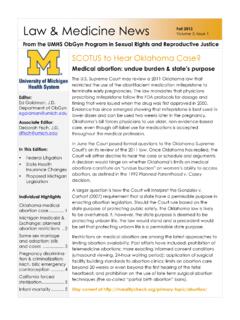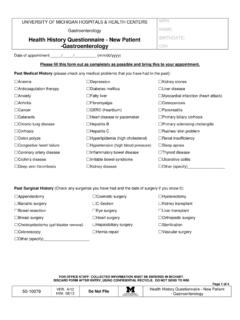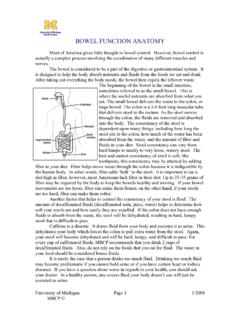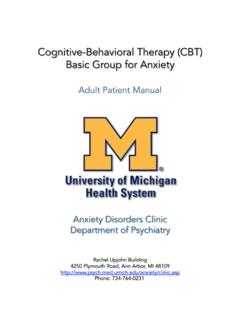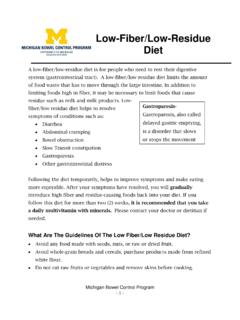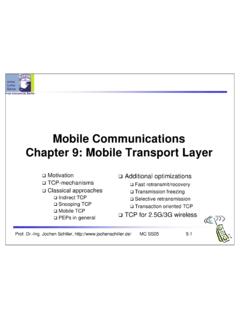Transcription of Acknowledgements
1 Acknowledgements Written and Edited by: Kristen Miner, LMSW Dan DeSena, LMSW, DMA Sara Tischler, LMSW Jessica Rimer, LMSW Acknowledgements Parts of this manual were broadly adapted and integrated from the following sources about depression, Cognitive-Behavioral Therapy, and group psychotherapy: Addis, & Martell, (2004). Overcoming depression one step at a time: The new behavioral activation treatment to getting your life back. Oakland, CA: New Harbinger. Beck, , Rush, & Emery, G. (1979). Cognitive therapy of depression. New York: Guilford Press. Beck, (2011). Cognitive therapy: Basics and beyond, (2nd ed.). New York: Guilford Press.
2 Burlingame, , MacKenzie, & Strauss, B. (2004). Small-group treatment: Evidence for effectiveness and mechanisms of change. In Lambert, Bergin, & Garfield (Eds.), Bergin and Garfield s handbook of psychotherapy and behavior change (5th ed., pp. 647-696). New York: Wiley. Burlingame, , Fuhriman, A., & Johnson, (2002). Cohesion in group psychotherapy. In Norcross (Ed.), Psychotherapy relationships that work: Therapist contributions and responsiveness to patients (pp. 71-87). New York: Oxford University Press. Dimidjian, S., Hollon, , Dobson, , Schmaling, , Kohlenberg, , Addis, , et al. (2006). Randomized trial of behavioral activation, cognitive therapy, and antidepressant medication in the acute treatment of adults with major depression.
3 Journal of Consulting and Clinical Psychology, 74(4), 658-670. Germer, & Neff, (2013). Self-compassion in clinical practice. Journal of Clinical Psychology: In Session, 69(8), 856 867. Hayes, , Strosahl, & Wilson, (2012). Acceptance and commitment therapy: The process of mindful change. New York: The Guilford Press. Jacobson, , Martell, , & Dimidjian, S. (2001). Behavioral activation treatment for depression: Returning to contextual roots. Clinical Psychology: Science and Practice, 8(3), 255-270. Lejuez, , Hopko, , LePage, J., Hopko, & McNeil, (2001). A brief behavioral activation treatment for depression. Cognitive and Behavioral Practice, 8, 164-175.
4 Martell, , Dimidjian, S. & Herman-Dunn (2010). Behavioral Activation for depression. New York: The Guilford Press. Martell, , Addis, & Jacobsen, (2001). Depression in context: Strategies for guided action. New York: Norton. Mynors-Wallis, L. (2005). Problem-solving treatment for anxiety and depression: A practical guide. New York: Oxford. Neff, K. (2011). Self-compassion: The proven power of being kind to yourself. New York: Harper-Collins. Neff, K. D. & Germer, C. K. (2013). A pilot study and randomized controlled trial of the mindful self-compassion program. Journal of Clinical Psychology, 69(1), 28 44. Sochting, I. (2014).
5 Cognitive-behavioral group therapy: Challenges and opportunities. Chichester, UK: Wiley Blackwell. Stoddard, & Afari, N. (2014). The big book of ACT metaphors. Oakland: New Harbinger. Williams, , Teasdale, , Segal, & Kabat-Zinn, J. (2007). The mindful way through depression: Freeing yourself from chronic unhappiness. New York: Guilford Press. Zettle, (2007). ACT for depression. Oakland: New Harbinger. Preface CBT Groups in the University of Michigan Department of Psychiatry i Cognitive-Behavioral Therapy Basic Group for Depression Group Information ii Cognitive-Behavioral Therapy (CBT) Cognitive Skills Group for Depression: Group Information iii Cognitive-Behavioral Therapy (CBT) Behavioral Activation Group for Depression: Group Information iv What is Cognitive-Behavioral Therapy?
6 V CBT vi What Does CBT for Depression Look Like? vii The Path Through Psychotherapy viii CBT Groups for Depression Rules of the Road x Chapter 1: Depression 101 Depression What causes depression? The Depression Downward Spiral My Depression Downward Spiral When bad things When bad things happened to The Internal Cycle The Noble Three Pathways: Dealing with Negative Events Depression Inconvenience Review Worksheet Notes Chapter 2: Self care Self-care: An important part of managing depression Sleep Hygiene Exercise Food for Your Mood? My Self-Care Plan Notes Chapter 3: Mindfulness Slow down the Mindfulness and the Brain Being More Nonjudgmental Mindfulness Exercises Notes Chapter 4: Cognitive Therapy Skills What are Cognitive Therapy Skills?
7 Negative Automatic Thoughts Thoughts and Emotions Identifying Negative Automatic Thoughts The Downward Arrow Technique Daily Thought Record Worksheet Cognitive Distortions Examples of Cognitive Distortions Thought Record Plus Examining the Evidence: Restructuring Negative Automatic Thoughts Examining the Evidence: Questions to Develop Alternate Responses Examining the Evidence: Written Methods Examining Thoughts Worksheet Examining the Evidence: A More Detailed Method Core Beliefs Identifying Core Beliefs Challenging Core Beliefs Core Beliefs: Costs and Benefits Core Belief Record: Recording Evidence That Contradicts My Old Belief Core Belief Record: Recording Evidence That Confirms or Suggests My New Belief Life Goals Analysis Life Goals Analysis Worksheet Example Life Goals Analysis Worksheet (blank) Self-Compassion Common Thoughts About Depression and Its Treatment Troubleshooting Cognitive Restructuring Notes Chapter 5: Behavioral Activation What is Behavioral Activation?
8 The First Vicious Cycle The Second Vicious Cycle Your Cycles? Activity Monitoring: Track Your Mood! Activity Monitoring Worksheet UP and DOWN activities A Life Worth Living: Values, Pleasure, Mastery, and Goals Values Values Rating Sheet Translating Values Into Activities Pleasure Mastery Activities List: Pleasure and Mastery Values, Pleasure, and Mastery Activities List Goal Setting Activity Planning Activity Planning Worksheet Pleasure Predicting Pleasure Predicting Sheet Problem Solving and Acceptance Dealing with Low Motivation Motivation Tips Behavioral Activation Tips Barriers and Resources Worksheet Notes Congratulations!
9 Chapter 6: Appendix Cognitive-Behavioral Therapy Resources for Depression: Workbooks and Self-Help Books Cognitive-Behavioral Therapy Resources: Workbooks and Self-help Books by Problem Area Cognitive-Behavioral Therapy Resources: Other Resources Additional Worksheets Notes Anxiety Program Depression Program CBT Exposure Group for Anxiety CBT Cognitive Skills Group for Anxiety Mindfulness for Anxiety Group CBT Basic Group for Anxiety (2 sections) CBT Cognitive Skills Group for Depression CBT Behavioral Activation Group for Depression CBT Basic Group for Depression Mindfulness-Based Cognitive Therapy for depression relapse prevention i.
10 Group Topics: Depression and CBT 101 (1st week of each month) Begin to understand your depression and what you can do about it using CBT skills. Self-Care and Mindfulness (2nd week of each month) We ll discuss how exercise, diet, sleep and other habits impact our mood. You ll also get an introduction to mindfulness and how it can assist in depression recovery. Cognitive Restructuring (3rd week of each month) Understanding and challenging our negative automatic thoughts is one important element of CBT treatment. We ll learn the basics in this module. Behavioral Activation (4th week of each month) In this module you ll learn how your behaviors impact the way that you feel.

